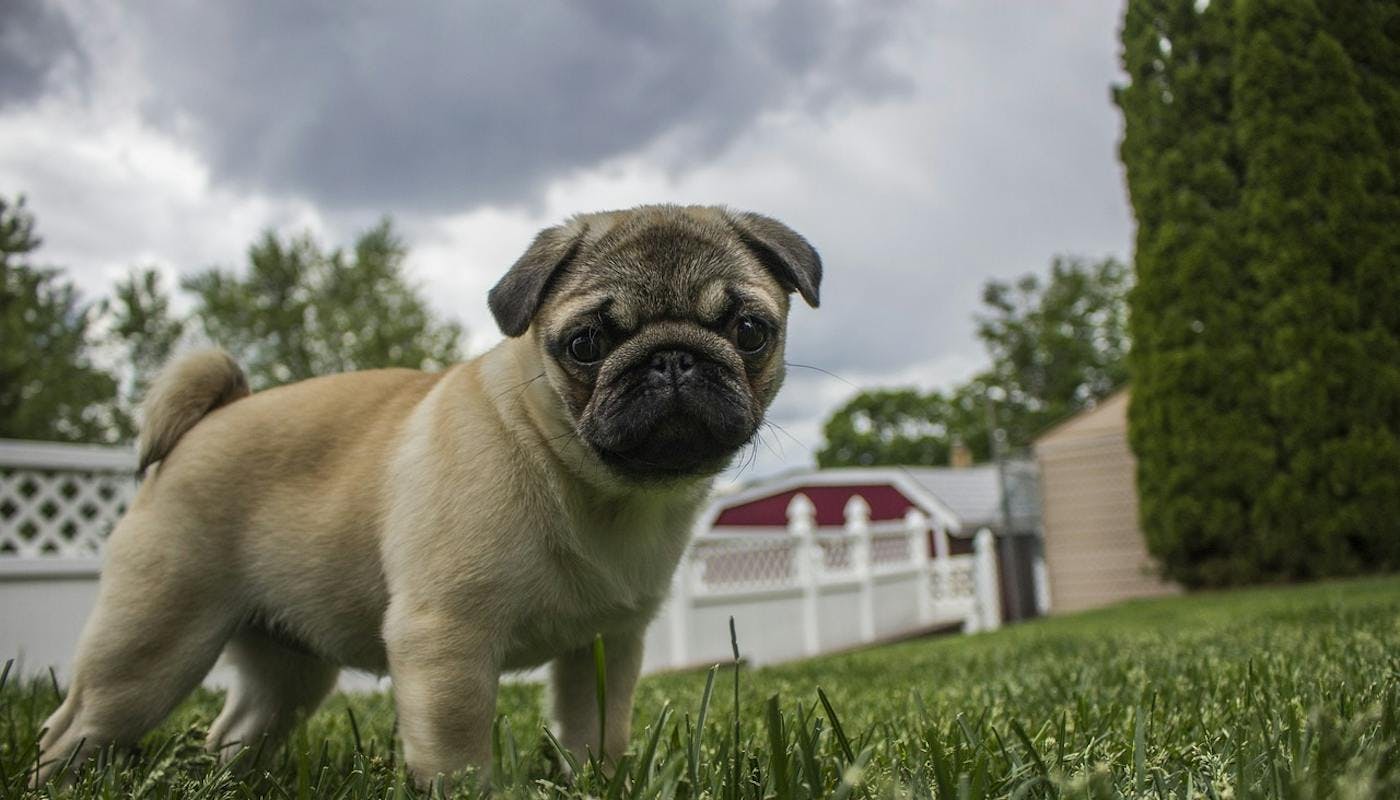How To Keep Your Dog Calm in a Storm
Have you ever been caught in a storm during a dog-walk? Wild winds and booming thunder can be frightening – and not just for our dogs! If summer brings more storms to your region, it’s time to check out our advice about helping your dog to stay calm in a storm.
Why Are Dogs Afraid of Storms?
Most dogs are sensitive to loud noises, ranging from the slam of a door to the bang of a firework. It’s normal – after all, their ancestors lived in the wild, where loud noises could bring danger.
Do you have a dog who seems to be able to detect an oncoming storm BEFORE it arrives? There’s a scientific explanation for that…
In the hours before a storm, air pressure drops, and the sky grows darker. Then there’s static buildup, which can give our furry friends an electric shock. In other words, our dogs might start getting the heebie-jeebies before the storm even begins (especially if they’ve experienced it before). In Penn State University, researcher Nancy Dreschel measured the level of cortisol (the stress hormone) in dogs’ saliva and found that it increased during and after a storm.https://www.psu.edu/news/agricultural-sciences/story/research-aimed-finding-way-soothe-thunderstorm-stressed-dogs/
What about dogs who are worried by rain, hail, or wind?
We can’t ask them... but if we could, we think dogs would tell us that they don’t like the sensation of rain or hail. Even some water-loving dogs dislike the relentless onset of cold rain: it’s unwanted, and it’s unpleasant. And then there’s the way they’re shut in the kitchen when they get in – because they’re too soggy for the nice, cozy couch!
Some experts think that dogs dislike the sound of rain and wind. Amplified by at least 10 times, beating rain (especially on a glass roof or skylight) must sound particularly aggressive.
There’s always the possibility of previous trauma, too. For example, did your dog get scolded last time they trotted through the house with muddy-puddle-paws? Or locked outside during a storm? Our dogs remember traumatic events and develop fear responses which can be hard to change.
Symptoms of Fear in Dogs
If you want to monitor your dog for fear during a storm, watch out for these symptoms – some are quite subtle.
- Licking the lips (a nervous habit).
- Tail between the legs (and kind of clenched, rather than relaxed).
- Less energy than usual.
- … Or more nervous energy and restlessness.
- Retreating to a safe or hidden place.
- More drool than usual.
- Yawning or paw-licking (symptoms of anxiety).
Tips on Calming Dogs in Storms
In her study, Nancy Dreschel discovered that owners couldn’t calm their dogs much during storm conditions. But the presence of canine companions, she said, helped dogs to stay calm.
However, bringing home a new dog to help your dog cope with loud thunder seems extreme… so try some of these tips first!
- Try not to leave your dog alone. If left, they could become destructive or vocal, which will exacerbate their stress and make the next storm even more difficult.
- Don’t punish, but don’t reward. If your dog’s showing stress, it’s important that you don’t reinforce it. This means you don’t scold them or fret over them. Instead, just stick to your normal routine. Petting and hugging is OK. Our dogs pick up cues from our own behaviors, so you’ll be helping a lot by staying cool and cheerful.
- Walk them (but don’t exhaust them). If you already know that a storm’s on the way, make sure your dog gets their walk ahead of time. Don’t overdo it though; there’s no need to exhaust them completely.
- If your dog is nervous ahead of a storm, or hides in the bathroom, you can try a storm vest. It’s a snug-fitting jacket which reduces static shocks and promotes the release of endorphins by applying pressure. (Be cautious that your dog doesn’t start to associate the sight of the storm vest with stress.)
- Give them an activity like chewing. Demolishing a cardboard box or edible chew is a natural stress-reliever for dogs. How about a treat ball, snuffle mat, or a puzzle feeder?
- Create a safe space for your dog. It could just be their regular bed. Make sure they have clear, easy access (but not restrictions). Pull the blinds and put on some music if you think your dog would like it (some owners swear by classical/learn/dog-lifestyle/do-dogs-like-classical-music!).
- Try a pheromone diffuser – ask your vet for a recommendation. Scent has a powerful effect on dogs. If you have lavender essential oil, you could try diffusing that.
Further Reading…
Think about getting bad-weather-ready with dog boots./learn/dog-health/are-dog-boots-necessary Ahead of winter, get our top tips for safe winter walking/learn/dog-lifestyle/winter-walkies-tips-and-advice. Get prepped for emergencies like fire, flood or hurricanes – make your dog their own emergency kit./learn/dog-lifestyle/is-your-dog-ready-for-an-emergency
